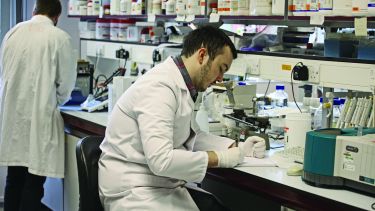Dr Thomas Guillerme, from the School of Biosciences, is one of 12 “talented” early career researchers to be awarded a share of £7.9m through the prestigious Natural Environment Research Council (NERC) Independent Research Fellowships (IRF).
The NERC IRF scheme is designed to develop scientific leadership among the most promising early career environmental scientists and aims to deliver ambitious, innovative and productive environmental research.
“NERC Independent Research Fellowships support talented early career researchers to work independently and deliver cutting-edge environmental science,” said Professor Peter Liss, Interim Executive Chair of NERC.
“I’d like to offer my congratulations to all those who have been awarded a fellowship this year.
“Environmental research advances our understanding of the planet and is the key to tackling and adapting to critical challenges such as climate change.”
Dr Guillerme’s research will look at how traits of organisms evolve and diversify and could shed light on which species are more likely to be extinct in the future.
His five year project called 'Phenotypic innovation through time and space' will focus on the diversification of species features including size, shape, colour, ecological role, rather than just their numbers.
“There are two main routes for species to acquire new traits: either through modifying already existing traits like a new bird species with a different colour than its sister species, or through evolving entirely novel traits, like how the ancestor of bats evolved wings from arms,” said Dr Guillerme.
“These two routes can be called elaboration and innovation. But these have never been defined properly across large groups of organisms before. This hampers our understanding of how biodiversity evolves and is maintained through time.
“For example, do species tend to first innovate and then elaborate? Or the other way around?”
Dr Guillerme said findings of the research could have important implications on understanding how species' traits diversity will change in the future in the context of the sixth mass extinction.
“For example, are species with innovation more likely to go extinct? He said. “And will that lead to more or less traits, innovation or elaboration in the future?”
Through the fellowship Dr Guillerme will develop a new, precise way to measure the traits, elaborations and innovations and will see how they change through time and space across birds and mammals, especially since the last mass extinction crisis that saw the extinction of dinosaurs.
Dr Guillerme added: “I think fellowships are a highly competitive lottery and I feel grateful to have been supported by an amazing group of mentors that provided me the intellectual, moral and financial opportunities to keep applying for fellowships and developing my research ideas.
“I’m super excited to develop these research questions forward but also to give back to the community by also providing support to other workers looking to pursue their research in academia.”
As part of the NERC IRF scheme Fellows receive five years of support, allowing them to focus on advancing their area of research, establishing international recognition, and championing equality, diversity, and inclusion within their research environment.

